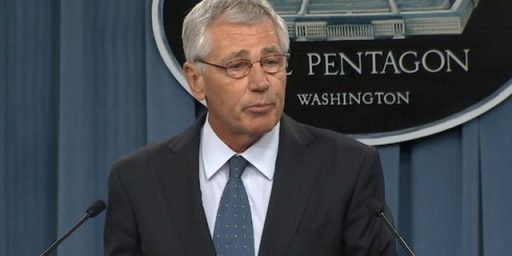Vietnam Vet Knows Nothing About Vietnam
GOP Senator Says Iraq Looking Like Vietnam (AP)
WASHINGTON (AP) — A leading Republican senator and prospective presidential candidate said Sunday that the war in Iraq has destabilized the Middle East and is looking more like the Vietnam conflict from a generation ago.
Nebraska Sen. Chuck Hagel, who received two Purple Hearts and other military honors for his service in Vietnam, reiterated his position that the United States needs to develop a strategy to leave Iraq.
Hagel scoffed at the idea that U.S. troops could be in Iraq four years from now at levels above 100,000, a contingency for which the Pentagon is preparing.
“We should start figuring out how we get out of there,” Hagel said on “This Week” on ABC. “But with this understanding, we cannot leave a vacuum that further destabilizes the Middle East. I think our involvement there has destabilized the Middle East. And the longer we stay there, I think the further destabilization will occur.”
Hagel said “stay the course” is not a policy. “By any standard, when you analyze 2 1/2 years in Iraq … we’re not winning,” he said.
He may have earned two Purple Hearts for his service in Vietnam, but this comparison is both ridiculous and ahistorical — the insurgency in Iraq is not at all similar to what we faced in Vietnam, in organization, strategy, or ideology. The obvious difference in terrain makes Hagel’s statements even more ludicrous. The only way the analogy makes any sense whatsoever is if Hagel believes that we are enmeshed in a necessary conflict in which we see only tactical victory, but we retreat anyway because politicians fear losing the hippie vote.
Further, if it’s accurate to say that we cannot (not just shouldn’t) muster 100,000 troops for four years in a worst-case scenario, then I want a refund on my share of the DoD budget.
But obviously we can’t take Hagel’s statements too seriously; as the article notes, he thinks he’s running for something. Perhaps he aspires to become the Republican Dennis Kucinich.





Chuck Hagel just consistently pisses me off. If he thinks he is running in 2008, he’s on crack.
Its nice to hear from a republican who’s lips are not welded to Bush’s rear end. As for Iraq & ‘Nam, in both situations we had great difficulty telling friend from foe. In both situations the enemy had support from across the border. In both situations extremes in weather, terrain etc. partially negated our advantage in firepower and technology. In both situations there was not overwhelming support for the war from the American people.
So to say there are no parallels is actually pretty stupid.
You obviously are too young to know first hand what Hegal means when he compares Iraq to Vietnam.
Cheap shot and trash talk from someone who wasn’t even born when the Vietnam War ended. Easy to write these things from the safety of your desk when the most danger you’ve faced is from paper cuts doing your schoolwork.
Reading is fundamental …
The story paraphrases Hagel as saying Iraq is looking MORE LIKE Vietnam. I.e., more of a resemblance than there used to be. That doesn’t require that Iraq actually be Vietnam II.
Click through, & you find: “The longer we stay there, the more similarities (to Vietnam) are going to come together.”
Given that the relevant aspect of Vietnam that Hagel plainly has in mind is “goddamn wasteland that American troops were stuck in for years,” then the analogy is not so inapt as suggested above.
anjin-san — in both conflicts each side wanted to win too. Your parallels are way too general. Consider the differences: a mountainous jungle versus a wide-open desert; a standing army plus an established guerrilla army versus an ad-hoc band of suicide bombers; defense of a government versus establishing one; and committed Marxist nationalists versus pan-Islamist fundamentalists. How you fight each is quite different, as are the opportunities for both reconciliation and withdrawal.
Ken & DC Loser — as usual, nice non sequiturs.
It’s sad to see DC following in adhominem-san’s footsteps.
Seriously, you’re confusing the tactical with the strategic. The terrain and weather has absolutely nothing to due with the situation of Vietnam and Iraq other than one is hot and humid and the other is hot and dry. In both cases we are/were propping up a government of our choosing (in VN after we blessed the Diem assassination) against a hostile insurgency. In both cases the security situation is bleak and not improving despite all the favorable metrics touted. The Iraqi security forces and military are not ready and their loyalty is highly suspect, just like the ARVN and most of the RVN’s government. We keep hoping the insurgents will engage us on terms of our choosing in set piece battles like Falluja, just like Vietnam, because we don’t know their organization and how to defeat them by counterinsurgency warfare. And I’ll just touch on the “Q” word here. If the Army chief of staff is on the record of planning on keeping the 100k trooplevel for the next four years or more I think you’re quickly approaching a quagmire that you don’t know how to get out of short of cutting and running. The rest I’ll leave to Greg Djerejian
Lost the link above.
http://www.belgraviadispatch.com/archives/004726.html
The “hippie vote” is not the fear. It gave Nixon a landslide despite the huge vote for Wallace.
The problem is a majority finding themselves disillusioned, unable to see the purpose of the war and angry that earlier claims of success were not met. In this it is increasingly resembling Vietnam.
Structurally there are many differences from Vietnam, but some specific weaknesses such as a lack of connection with the people are even more extreme, our officials were not locked into a palace complex in Vietnam. And despite right wing claims most of us do know about the 3,000 schools and have heard the “press doesn’t tell us the good news.” Which isn’t completely true, I’ve seen lots of quotes from generals and officials, but if the issue is accent then yes, it is overly focused on big booms but…
the average US news watcher or even reader has no idea that a large portion of southern Iraq is under the control of Iranian leaning Shiite militias or that last month there were more than 700 shooting deaths in Baghdad (more than NYC has in a year) few listed in our papers, that they consisted of simple crime, not so simple crime, exceedingly complicated crime and political death squads in what may be developing civil war. The average American also believes that electric production has increased since the fall of Saddam.
So reporting is skewed in both directions.
Over all most Americans don’t think that making huge sacrifices for other people is worth great cost. We don’t see demonstrations for Sudan. While I do believe they are capable of sacrifice this war was presented as a bait and switch. Individuals were fired for saying it could cost hundreds of billions. Nowadays supporters bring up qualifying statements to claim they always knew, but back a couple of years ago it was generally presented first as easy and then as primarily accomplished.
The record now shows that the military, the State Department and others warned of problems very similar to those that developed, but no effort was made to prepare for them and when they did start to occur months and often more were delayed in denial.
The sense of incompetence also echoes Vietnam.